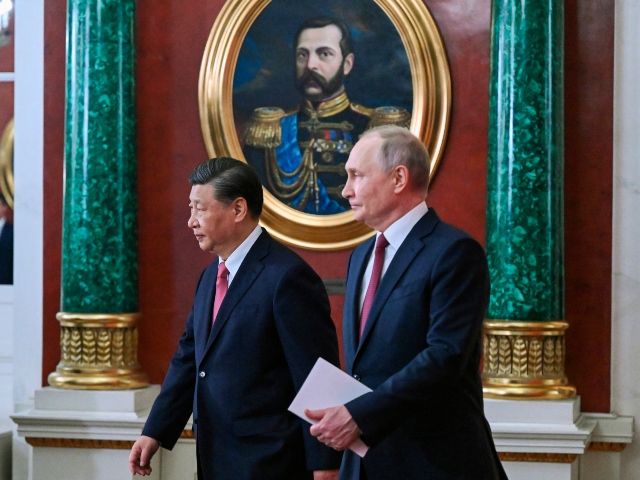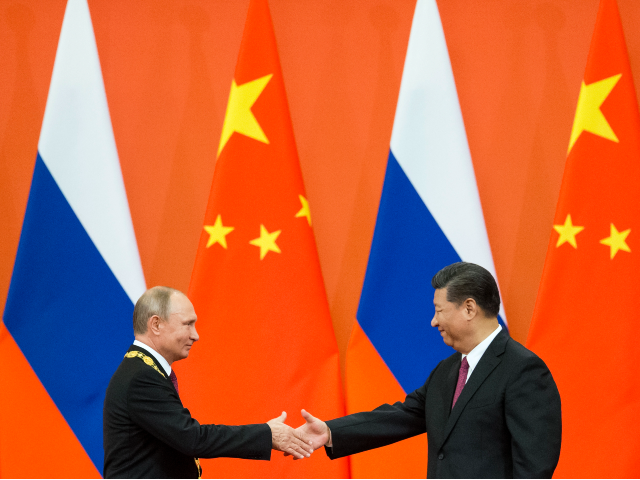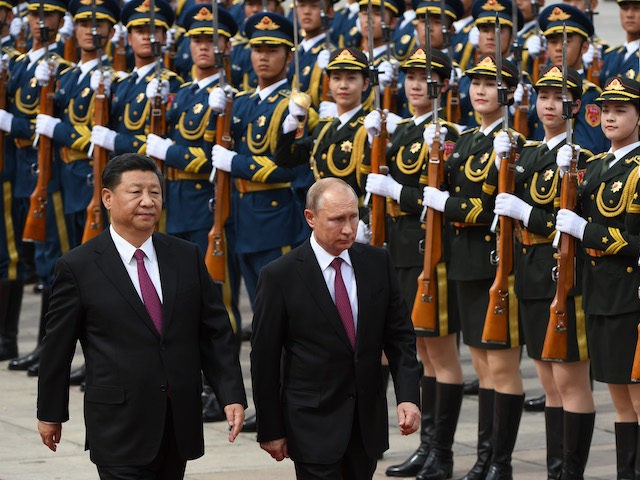A top aide to Russian strongman Vladimir Putin said this week that the head of state was planning to visit China in October for an event promoting Beijing’s Belt and Road Initiative (BRI), an infrastructure scheme designed to make impoverished countries indebted to China.
The Russian news agency Tass relayed in a report on Wednesday that both Putin’s aide, Yury Ushakov, and top Kremlin spokesman Dmitry Peskov, made public statements expecting that Putin would leave Russia for China in October. In addition to the planned Belt and Road Forum, October is a significant month for the Chinese Communist Party, when it typically organizes a massive parade in Beijing to celebrate the founding of the People’s Republic of China under mass murderer Mao Zedong.
Putin last visited China in February 2022 to attend the Beijing Winter Olympics, in which Russia was technically banned from participating. Genocidal Chinese dictator Xi Jinping most recently visited Moscow in March of this year to discuss bilateral ties and make a show of solidarity amid growing evidence that Beijing was losing patience with Russia’s extended invasion of Ukraine, a Belt and Road member country.
While the Chinese Communist Party has conspicuously refused to condemn the invasion, Putin openly remarked last year that the Chinese leadership had “concerns” with the conflict and Xi agreed to hold a phone conversation with Ukrainian President Volodymyr Zelensky this year. Adding to potential strife, the Russian military damaged the Chinese consulate in Odessa last week while bombing the Ukrainian city.
Ushakov, the presidential aide, reportedly said on Tuesday that Chinese officials had invited Putin to the Belt and Road Forum, indicating that the meeting would be focused on China’s infrastructure scheme rather than the invasion of Ukraine.

Russian President Vladimir Putin, right, and Chinese President Xi Jinping arrive to attend a signing ceremony following their talks at The Grand Kremlin Palace, in Moscow, Russia, Tuesday, March 21, 2023. (Grigory Sysoyev, Sputnik, Kremlin Pool Photo via AP)
“We have received an invitation and plan to go to China,” Tass quoted Ushakov as saying.
Peskov, the presidential spokesman, reportedly described the top issues of conversation between Putin and Xi as “bilateral trade and economic cooperation,” but allowed that the two friendly leaders would “exchange views on the current international situation.”
The Russian officials’ comments this week follow reports in mid-July that Moscow was preparing for such a visit. Tass claimed the China visit was underway citing comments by former Russian ambassador to China Andrey Denisov, who told the regime-friendly outlet that Xi Jinping had personally extended the invitation to Putin through a meeting with Duma upper house leader Valentina Ivanovna Matviyenko.
“During the meeting with Valentina Ivanovna Matviyenko, Chairman Xi Jinping said that the Chinese side was getting ready for a visit by the Russian president in October in order to participate in the Third Belt and Road Forum,” Denisov told Tass.
The Chinese government has yet to confirm the reports. After Denisov’s statement appeared in Tass, Foreign Ministry spokesman Wang Wenbin told reporters merely that China was preparing for the Belt and Road forum and “China is in communication with BRI partners on this.”
Transcripts of the Chinese Foreign Ministry’s daily press briefings on Tuesday and Wednesday do not feature any questions about Russia or a potential Putin visit to China.
The Chinese government often refuses to confirm visits by foreign dignitaries to the country until the person in question has already landed within the country. China notably refused to confirm visits by American officials, Secretary of State Antony Blinken and Treasury Secretary Janet Yellen, until they had arrived in Beijing. The Communist Party also refused to confirm that Blinken had planned a visit to the country in February when reports claimed that the top diplomat had canceled his visit due to the discovery of a Chinese espionage balloon in American airspace.
Xi Jinping announced plans for a Belt and Road Forum to bring together member states in November to mark the tenth anniversary of the BRI. Xi launched the BRI during his first year at the helm of China as a plan allegedly meant to provide loans to poorer countries to allow them to develop, used as funding for the construction of roads, ports, railways, and other infrastructure projects. The BRI plans typically require the countries to use the loan money to pay Chinese companies to build the projects, injecting the money back into the Chinese economy. When the countries cannot pay the loans back as a result of high-interest rates and other predatory provisions in the agreements, China seizes the projects, eroding the sovereignty of the countries involved.

Chinese President Xi Jinping, right, and Russian President Vladimir Putin shake hands during an awarding ceremony at the Great Hall of the People in Beijing, China, on June 8, 2018. (AP Photo/Alexander Zemlianichenko, Pool, File)
Following Xi’s announcement of a Belt and Road Forum in November, the state-run Chinese Global Times newspaper cited regime-approved “experts” who predicted the forum would “make new plans for the world to better use the BRI to promote the building of a community with a shared future for mankind,” using the terminology of “Xi Jinping Thought,” China’s state ideology.
Russia is believed to be an official Belt and Road partner, but neither country confirmed an official entry of Russia into the BRI. Chinese BRI investment in Russia dropped to zero in the aftermath of Putin announcing a “special operation” to oust Zelensky in Ukraine.
In mid-July, when Denisov claimed Xi invited Putin to the Belt and Road Forum, Putin spokesman Peskov claimed that the issues of mutual interest between Putin and Xi are “clear,” without actually confirming they would be meeting at the Forum.
“The topics are clear. … The topics are quite extensive. These include bilateral trade and economic cooperation, and it is also important to exchange views on the situation in the world, in various regions, which are important for each of our countries,” Peskov said.
In addition to economic cooperation, the two countries’ military forces have increased cooperation in recent months. Last week, the Russian Navy and China’s People’s Liberation Army Navy (PLA Navy) held joint military exercises in the Sea of Japan, which straddles Japan and the Korean Peninsula (Korea refers to it as the East Sea), allegedly intended for “the safeguarding of peace and stability in Asia-Pacific amid tensions and potential threats in the region.” The exercises were a show of force in the context of North Korea, a close ally of both Beijing’s and Moscow’s, increasingly threatening to use nuclear weapons against South Korea and America.
On Wednesday, Tass reported that the PLA Navy is also planning joint patrols with the Russian Navy in the northwest Pacific Ocean. The Chinese Defense Ministry reportedly announced the new patrols.

COMMENTS
Please let us know if you're having issues with commenting.